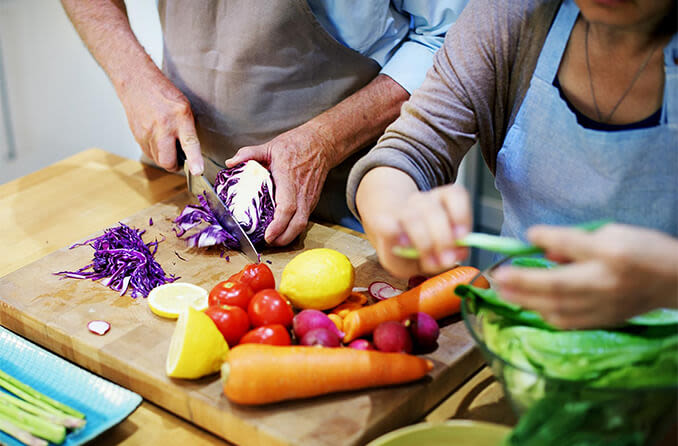Carrots are great for your eyes, and so are an array of other foods.
more
This article is based on reporting that features expert sources.
View as article
Table of Contents
A variety of colourful heritage carrots on an outdoor market stall
CREDIT
Bugs Bunny knows what to eat for eye health.
Anyone who’s ever watched the cartoon rabbit Bugs Bunny munching on a carrot likely knows that the orange-colored vegetable is good for your eye health. Carrots are a great source of vitamin A, which is crucial for eye health.
A variety of foods besides carrots are good for your eyes.
While carrots and vitamin A are widely recognized as great for eye health, there are other important foods and nutrients that can help keep your eyes healthy and prevent vision problems, Jones says.
“For example, fatty acids are essential for maintaining the health of the cell membranes that surround the eye,” she says. “These membranes help to protect the eye from damage and keep it properly lubricated. In addition, antioxidants are important for preventing age-related vision problems.”
Antioxidants are natural or man-made substances that can help shield the body from cell damage caused by free radicals, according to the National Center for Complementary and Integrative Health. Such cell damage is associated with a raft of chronic diseases and health problems, including arthritis, cancer and vision loss. Certain fruits, like blueberries, are rich in antioxidants.
Here are the top foods that can help boost your eye health:
“Without enough vitamin A, your eyes cannot produce enough moisture to keep them properly lubricated,” according to the American Academy of Ophthalmology. Not getting enough vitamin A can be tragic and fatal. Worldwide, vitamin A deficiency is the leading cause of preventable blindness, according to the AAO. Annually, 250,000 to 500,000 children become blind every year because of a lack of sufficient vitamin A.
Broccoli, collards, corn, green beans, peas and turnip greens
Broccoli, collards, corn, green beans, peas and turnip greens are all rich in lutein and zeaxanthin, substances that research suggests can safeguard your eyes from age-related macular degeneration and cataracts, Jones says.
For example, a review of research published in 2018 in the journal Nutrients suggests says that “lutein is known to improve or even prevent age-related macular disease which is the leading cause of blindness and vision impairment.” Lutein is a carotenoid, an organic pigment produced by plants that gives color to corn, pumpkins, tomatoes, salmon, lobster and shrimp.
Dark leafy greens
Dark, leafy greens are another great source of vitamin A, and are therefore foods that are good for your eyes, says Lana Nasrallah, manager of clinical nutrition at UNC Health, a not-for-profit integrated health care system based in Chapel Hill, North Carolina. It’s owned by the state of North Carolina. “Dark, leafy greens are packed with vitamin A, an antioxidant that helps protect your eyes and serves as a huge booster to the immune system and healthy cell growth,” she says.
Dark, leafy greens include:
Arugula, butterhead, green leaf and romaine lettuce.
Broccoli.
Cabbage.
Collard greens.
Spinach.
Swiss chard.
Zeaxanthin is also a carotenoid, which provides color to corn, goji berries and saffron. Research suggests it can help prevent and treat age-related macular degeneration, retinitis pigmentosa and cataracts.
If you’re severely deficient in vitamin A, you can develop a serious condition called xerophthalmia, says Lisa Jones, a registered dietitian based in Philadelphia. This condition is characterized by abnormal dryness of the cornea and conjunctiva of the eye, with inflammation and ridge formation. “However, research suggests that there is a reduced risk of developing cataracts and age-related macular degeneration if you have a high intake of vitamin AEggsFish
Essential fatty acids do your whole body good, including your eyes, by helping with visual development and retinal function, and possibly protecting against dry eye. A variety of fish are high in omega-3 fatty acids, which research suggests may reverse the signs of dry eye syndrome and slow the progression of vision loss.
Fish high in omega-3 fatty acids include:
Anchovies.
Halibut.
Mackerel.
Salmon.
Sardines.
Tuna.
Egg yolks are a rich source of lutein and zeaxanthin, which research suggests can protect your eyes from cataracts and age-related macular degeneration, Nasrallah says. “Dietary intake of these compounds have been shown to have antioxidant properties and improve the health of the eye,” she says.Oranges and orange juice
Oranges are a good source of lutein and zeaxanthin, which research suggests can protect your eyes from cataracts and age-related macular degeneration. They are also good sources of vitamin C, and research suggests that dietary vitamin C is protective against cataract progression.
